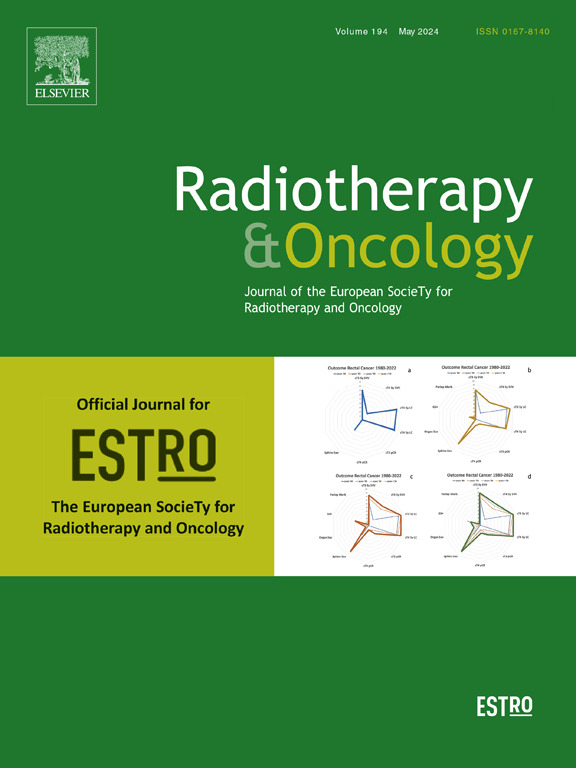SHORT-TERM AND LONG-TERM IMPACT OF DIDACTIC INSTRUCTION UPON MEDICOLEGAL QUALITY OF RADIATION ONCOLOGY RESIDENT PHYSICIAN DOCUMENTATION
IF 5.3
1区 医学
Q1 ONCOLOGY
引用次数: 0
Abstract
Purpose:
Effective documentation is essential in medical practice, particularly in Radiation Oncology (RO), where interdisciplinary collaboration is key. While documentation guidelines exist, it is uncertain if RO residents are aware of or adhere to them. This study assessed RO residents’ medicolegal knowledge of clinical documentation and evaluated the short- and long-term impact of an educational intervention on documentation practices.
Materials and Methods:
Grading rubrics for consultation and progress notes were created using existing guidelines. Residents from two academic institutions attended a virtual didactic seminar on medicolegal documentation. An electronic anonymous survey assessed resident knowledge and perspectives, both pre- and post-seminar. Randomly selected consultation and progress notes completed before the seminar and during short-term (<3 months) and long-term (<18 months) intervals were evaluated using the rubrics. Descriptive statistics and T-tests were utilized to analyze the data.
Results:
14 residents participated and completed surveys, while 11 submitted documentation. None had prior education specific to RO documentation, nor were they aware of available resources. Post-seminar, participants’ understanding of documentation (2.79 versus 3.43, p=0.045), informed consent (2.71 versus 3.79, p=0.002), and knowledge testing quiz scores (86.6% versus 95.5%, p=0.001) increased. Clinically, sustained improvements were observed in consultation notes (69.8% versus 79.9% & 87.4%, p=0.001 & p<0.001; short-term and long-term respectively) and progress notes (55% versus 75.2% & 79.4%, p<0.001 & p<0.001; short-term and long-term respectively).
Conclusions:
Our seminar significantly enhanced residents’ medicolegal knowledge and documentation quality, with immediate and sustained effects. Additionally, surveys revealed a lack of specialty-specific documentation education. Given the observed improvements in knowledge and clinical documentation, integrating structured medicolegal training into residency curricula could help standardize documentation practices. Future studies could explore the sustained retention of these skills and assess the impact of continued reinforcement through periodic educational seminars.
教学指导对放射肿瘤学住院医师文件医学法律质量的短期和长期影响
目的:有效的文献记录在医疗实践中是必不可少的,特别是在放射肿瘤学(RO)中,跨学科合作是关键。虽然存在文件指导方针,但不确定RO居民是否知道或遵守这些指导方针。本研究评估了RO居民对临床文件的医学法律知识,并评估了教育干预对文件实践的短期和长期影响。材料和方法:根据现有的指导方针制定了咨询和进度记录的评分标准。来自两个学术机构的居民参加了一个关于医学法律文件的虚拟教学研讨会。一项电子匿名调查评估了研讨会前后居民的知识和观点。随机选择在研讨会前、短期(3个月)和长期(18个月)期间完成的咨询和进展记录,使用这些准则进行评估。采用描述性统计和t检验对数据进行分析。结果:14名居民参与并完成调查,11名居民提交资料。他们都没有受过专门的RO文件方面的教育,也不知道现有的资源。研讨会结束后,参与者对文件的理解(2.79对3.43,p=0.045),知情同意(2.71对3.79,p=0.002)和知识测试测验分数(86.6%对95.5%,p=0.001)增加。临床方面,在会诊记录(69.8% vs 79.9% & 87.4%, p=0.001;短期和长期)和进展记录(55% vs 75.2% & 79.4%, p=0.001 & p<0.001;短期和长期分别)中观察到持续的改善。结论:研修班显著提高了居民的医学法律知识水平和文献质量,效果立竿见影、持续有效。此外,调查显示缺乏专门的文献教育。鉴于观察到的知识和临床文件方面的改进,将结构化的医学法律培训纳入住院医师课程有助于规范文件实践。未来的研究可以探讨这些技能的持续保留,并评估通过定期教育研讨会继续加强的影响。
本文章由计算机程序翻译,如有差异,请以英文原文为准。
求助全文
约1分钟内获得全文
求助全文
来源期刊

Radiotherapy and Oncology
医学-核医学
CiteScore
10.30
自引率
10.50%
发文量
2445
审稿时长
45 days
期刊介绍:
Radiotherapy and Oncology publishes papers describing original research as well as review articles. It covers areas of interest relating to radiation oncology. This includes: clinical radiotherapy, combined modality treatment, translational studies, epidemiological outcomes, imaging, dosimetry, and radiation therapy planning, experimental work in radiobiology, chemobiology, hyperthermia and tumour biology, as well as data science in radiation oncology and physics aspects relevant to oncology.Papers on more general aspects of interest to the radiation oncologist including chemotherapy, surgery and immunology are also published.
 求助内容:
求助内容: 应助结果提醒方式:
应助结果提醒方式:


